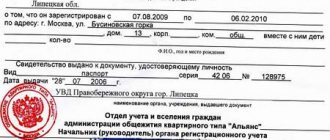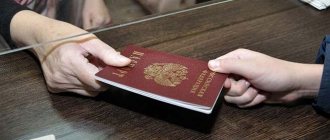Article updated: December 20, 2021
Elena GrushinaRealtor with a legal education. Work experience - 12 years
Hello. Here I have posted instructions on how a citizen can register in a municipal apartment. I sorted out 2 options for registration: 1) being a tenant of an apartment under a social tenancy agreement; 2) as a stranger to a relative or non-relative.
A small digression - if you need a free consultation, write online to the lawyer on the right or call (24 hours a day, seven days a week for all regions of the Russian Federation) Moscow and the region;
8 (812) 425-62-89 — St. Petersburg and region; all regions of the Russian Federation. Other articles
How to register a person in an apartment that is privately owned (to the owner)
Where to contact
The cancellation of registration ahead of schedule is carried out by authorized government agencies:
- territorial department of the Federal Migration Service at the place of residence;
- Multifunctional Center;
- management company, housing cooperative, another option for service organizations.
The processing time for applications from citizens who intend to deregister ahead of time is established by clause 21 of the Administrative Regulations and is 3 business days.
Cancellation of temporary registration can occur in person, or by remote contact - by regular mail or electronically.
It is convenient to use the services of the MFC, where the reception of requests from citizens is organized according to the “one window” principle. Starting from 2021, employees of a multifunctional center have the right to independently register deregistration by making the necessary notes in their passport (if we are talking about permanent registration). The basis for processing the application will be the papers submitted to the window along with the application. A departure slip is immediately issued.
On the government services website, you can submit an application for deregistration in advance by submitting a completed electronic form via the Internet. The option is available only to registered users.
Service organizations also provide for the possibility of accepting requests regarding the departure of citizens at their place of residence. Such organizations include housing cooperatives, management companies, housing departments, etc. A condition for deregistration is the presence of a passport office (or move-in/check-out department) in the organization.
The choice of the method of application is determined by the peculiarities of the organization of accounting in a particular locality, as well as the desire of the citizens who applied.
Possible risks for the owner
When registering unfamiliar people, for example, when renting out an apartment, the owner bears certain risks, because it is quite difficult to determine the degree of integrity and responsibility of new residents. Below we will consider situations when the owner of a living space may have difficulties evicting residents.
When registering children
Registering a child at the place of residence is a right that temporary residents receive automatically if the landlord has agreed to register. However, the owner in this case may face a problem. If he can discharge an adult at any time by court decision, then with minors everything is not so simple. According to the law, a child can be deregistered only if the parents have found a new place of residence for him. Thus, homeowners have to wait for this moment. And temporary residents are most often in no hurry to leave the apartment.
Refugees and military personnel
According to Government Decree No. 713, registration of refugees and military personnel follows the same rules as other categories of citizens. The only caveat: you will need to collect some additional documents, in particular, confirmation of refugee status or a certificate from the military registration and enlistment office. Temporary registration may not be completed by military personnel on a business trip.
Pregnant women
An owner who registers a pregnant woman in his apartment must be prepared for the consequences. If she gives birth, she has every right to register the child at the temporary registration address. It will not be possible to forcibly evict them, because in most cases the court sides with the mother and child. The owner of the apartment will have to wait until the woman finds another place to live and moves out voluntarily.
Material risks
As mentioned earlier, the owner of the apartment, even if he does not live in it, bears full responsibility for it to the state. In other words, he must pay property taxes and cover utility bills.
Public utilities
In order for those registered to pay for utilities, the owner must enter into a lease agreement with them, stipulating this obligation in it. Otherwise, you will have to pay the bills yourself. Considering that most apartments are currently equipped with meters, it is not difficult to guess that the payment for utilities will be high. It is advisable for the owner to document and assign the obligation to pay bills to tenants with temporary registration. However, if they do not fulfill it, and a debt arises, then the owner will be responsible to the state.
Grounds for termination of temporary registration
As mentioned above, temporary registration can be terminated by both the citizen who has the temporary registration and the owner of the residential premises in which such registration was issued.
So, if the initiator is the citizen himself, then most often this happens due to:
- termination of studies by a student of a secondary specialized and higher educational institution , if we are talking about renting housing under a specially concluded agreement or about eviction from a hostel;
- vacation or sanatorium-resort treatment is terminated for any reason , including personal reasons;
- in the case of temporary registration on the basis of being on a business trip, the basis for termination of this type of registration may be a transfer of the place of business trip;
- lack of work at the place of temporary registration , as a result of which a person has to leave this place of residence;
- moving to another place of residence due to necessity or personal desire;
- the actual desire of a particular person to deregister from a particular place of residence.
If we are talking about the owner of the premises, then for him the list of grounds on which he can demand the deregistration of a person is seriously narrowed. In particular, such cases include:
- violation of accepted norms of law by a person who has received temporary registration in the premises, even if such a violation is not confirmed from the point of view of law enforcement officials;
- failure to comply with sanitary standards that are established for a specific type of housing by persons who have received temporary registration in the premises and are living in it;
- existence of debts for utilities , if their payment was included in the terms of the rental agreement for residential premises and the registration agreement in it (if such an agreement was drawn up separately);
- if a registered person does not appear at the place of his temporary registration for a long period and has not notified the owner of the premises about the reasons for such absence, then the owner has the right to demand that such registration be terminated early (however, from the point of view of legislation, there is no definition of what should be considered a long period of time) period of absence);
- own desires of the owner of the premises , for example, due to the need to sell housing through sale or donation.
Each of the listed cases of early termination of temporary registration requires mandatory documentation and confirmation from a legal point of view.
We make a decision
People who have permanent registration in the city of residence can afford it and limit themselves to it. Visitors are forced to contact the landlord with a request to obtain temporary registration. Let's weigh the pros and cons.
Behind
- Decoration gives a competitive advantage in the rental market: such an apartment will be rented faster and more willingly, perhaps even a little more expensive.
- This service will increase the loyalty of residents towards the apartment owner: having registered at their place of residence, they are likely to settle for a long time.
- Properly executed documents affect the social well-being of residents: more employment opportunities, guaranteed medical care in the district clinic, places in a school near their home. All this reduces the likelihood of leaving due to job loss, illness or domestic problems.
- If the tenants caused damage to the landlord's property, caused a flood or fire, the presence of official registration will become proof of their residence in the apartment and will help to recover damages through the court. One apartment rental agreement is often not enough for this.
Against
- If one of the residents commits a crime, law enforcement agencies will look for him at his place of registration, which will create inconvenience for the apartment owner.
- If the tenant has debts, then bailiffs will come to the apartment and inventory the property, including that belonging to the owner of the property.
- The appearance of new tenants in an apartment may attract the attention of the tax service, which will create problems for the owner if he does not submit returns and does not pay taxes. Read more about responsibility here.
- Utility bills will increase - slightly if the apartment has meters. If there are no meters and payments are calculated based on the number of residents, then the increase in rent will be significant.
Cancellation of temporary registration
Deletion from temporary registration at the place of stay occurs automatically upon the date specified in the papers. In addition, registration can be terminated at the initiative of the citizen who is registered in the residential premises, as well as the person who is the owner of the housing.
Grounds for termination:
- the registration period has expired;
- departure from hotels, holiday homes, etc.;
- deregistration from temporary registration before the deadline specified in the papers.
Important! If the deregistration does not occur automatically, but the person wishes to terminate his registration and is removed from the register, then the relevant authorities must be notified about this. Employees are required to know from what specific date he does not plan to live at that address. And in case of relocation to another place of residence, he is registered there.
This is very important, since temporary registration, like permanent registration, affects the population’s ability to enroll their children in a particular school, receive a pension at a specific address, etc.
A person deregistered must be discharged from the apartment in accordance with a certain legislative procedure. The owner of the apartment in which the person is registered also has the right to withdraw his written request for temporary registration at the place of residence and expel him from the apartment if there are grounds. When carrying out the procedure forcibly, they must be quite serious.
DELETE//www.youtube.com/watch?v=MojxmU4nJSU
Rights of the registered
Citizens who have registered for a short period of time have the opportunity to live in real estate and use it. They cannot own or dispose of property.
Tenants receive prerogatives:
- register in the living space minors who are closely related to them;
- take out loans from a bank, indicating your residential address in the application form;
- change the finish;
- sublease premises if the owner gives consent to this;
- receive benefits, pensions, benefits, etc.
Citizens register for housing in order to:
- apply for a job;
- register children in kindergarten, school;
- receive medical care.
Persons with registration for a period of 3 months to 5 years do not have the right to:
- register relatives in the living space with the exception of children;
- pledge property against a bank loan;
- enter into purchase and sale transactions, exchange, donation;
- bequeath real estate.
Definition of concepts
A person with temporary registration has the right to be registered at a specific address for a certain period of time. Many people believe that he should live in this apartment. But the law does not stipulate the obligation of the homeowner to provide him with a roof over his head.
You can also obtain temporary registration in family-type dormitories. As a rule, state-owned plants and factories must have them. In this situation, the person will live at the place of registration.
In large cities, temporary registration can be obtained for a certain amount of money. Individuals make money from this, receiving rewards in return.
For temporary registration a number of requirements must be met:
- the owner of the property and everyone living in it must give their consent;
- if the property is in shared ownership, then all its co-owners give permission;
- permission from the cooperative will be required if the resident is not a member;
- permission of the legal entity or organization responsible for the property.
If a client lives in another locality for more than three months without registration, he will need to pay a fine of 2,000 rubles. It may not be charged only if the person is refused temporary registration in writing.
The most common reasons for a negative decision are:
- insufficient number of square meters;
- the property is not suitable for habitation;
- the passport of a Russian citizen is invalid;
- landlord's ban.
Thus, if you plan to move to another locality, you need to think in advance about where to get temporary registration. You need to be very careful, as there are many scammers who will take money for their services, but never prepare the documents.
Is it worth making money from registration?
You should think several times before registering strangers in your apartment or house. Easy money can turn into big troubles, even criminal liability.
For example:
- For fictitious registration, the owner of the home can be punished criminally under Art. 322.2 of the Criminal Code of the Russian Federation: fine from 100 to 500 thousand rubles, forced labor or imprisonment for up to three years.
- If you do not inform the Federal Migration Service about the fact of registration and deregistration of a citizen of another country, then you will also be fined: 4 thousand rubles for one migrant.
- If you admit that you have concluded a rental agreement, you will have to pay a fine and unpaid taxes in the amount of 13 percent of the average price tag for the service in your area.
Temporary registration of a minor child
Registration documents are submitted by parents of minors along with their documents. The procedure is free for all citizens. The list of documents for temporary registration of children is quite short:
- An application filled out by the legal representative of the minor on the prescribed form.
- A copy of the birth certificate with the reverse side showing the citizenship stamp. If the child permanently resides abroad, then his foreign passport is presented.
- Children over 14 years of age submit a copy of their Russian passport.
Within 3 days, the FMS authorities check all the information provided along with the application, and after that they issue certificates of temporary registration. You can also submit documents remotely (by mail, through the government services portal), but you can obtain certificates only by visiting a FMS office.
If a minor is not yet 14 years old, he can only be registered at the place of permanent or temporary registration of his parent (legal representative). Persons over 14 years of age can register without parents. In this case, the package of documents is expanded with the written consent of the parents of the minor or his other legal representatives for temporary registration at the specified address.
It is important to note that consent from both parents is required for temporary registration . If there is no agreement between the parents on this issue (one is for registration, and the other is against), then the issue is resolved in court, since the ordinary procedure does not provide a general solution for disputes of this kind.
It is also noteworthy that deregistration at the place of permanent registration of a minor is not required . The law does not prohibit having permanent registration at one address, while registering temporarily at a completely different address. The certificate of temporary registration must indicate the period during which it is valid. After its expiration, the minor must be temporarily registered at some other or the same address, or within 7 days leave for the place of his permanent registration.
By law, children must be registered where their parents live, and the consent of the property owner is not required for these actions. This creates certain risks for the property owner .
A typical example of this: a citizen entered into a rental agreement and moved into an apartment with his child. Following this, he carried out temporary registration at this address for himself and for the child. The tenancy agreement has expired, there are no grounds for extending the temporary registration of the employer, but only through the court can the minor be re-registered at the same address. As a result, the owner will not be able to sell or otherwise dispose of his apartment while a child is registered in it, albeit temporarily.
To avoid such disputes, the terms and conditions must be carefully spelled out in the rental agreement. After all, according to the law, if the parents do not have permanent registration anywhere, the child cannot be discharged into the void. In the court of first instance, the owner of the property will most likely be denied the forcible eviction of the child.
A similar situation may arise when a newborn (adopted or taken into custody) child appears to a family that has moved into an apartment. With the arrival of the baby, the parents will temporarily legally register him at their place of residence, and for this they will not even need to obtain the consent of the owner of the home.
Here it is worth explaining each risk in detail, given how different they are:
- Risk of loss of property rights. Does not exist, since temporary registration has absolutely nothing to do with the ownership of real estate, no matter who the temporarily registered person is, no matter what age he is.
- Increase in utility bills. That part of them, which is paid not according to meters, but according to the number of registered persons, will increase in proportion to the number of residents. If the rental agreement does not indicate the obligation of tenants to pay for utilities, then the owner of the property will pay for them.
- Inconsistency between the timing of registration of the minor’s parents and the minor’s own. For example, if the child’s registration period has not yet expired, but the temporary registration period for his parents has expired, then they will be able to legally register with their child again.
- Erroneous registration of a minor, not on a temporary, but on a permanent basis, will not allow him to be later discharged even in court. You will have to sell your home, from which the new owner can remove the minor on the basis of Art. 292 of the Civil Code of the Russian Federation and Article 31 of the Housing Code of the Russian Federation.
To summarize, we can say that registering a minor does not entail any risk for the owner of losing rights to real estate, but it is much more difficult to register a minor than his parents, and sometimes this is only possible in court.
The law provides for mandatory registration at the place of residence. Registration can be permanent or temporary, but it must exist. If it is available, employment is provided, children are enrolled in school or a medical institution, and benefits and subsidies are provided.
ATTENTION! If a citizen moves for a long period (more than 90 days) to another locality, he is obliged to register there, temporarily.
The fact of temporary registration is confirmed by a special certificate; registration is carried out for a certain period; if necessary, it will need to be extended. A certificate of temporary registration is valid if it is presented upon request along with a civil passport.
The law on temporary registration does not limit the places that can act as temporary housing. This can be an ordinary rented apartment or house, as well as hotels, a sanatorium, an institution that provides medical services to a citizen, places of restriction of freedom, and tourist centers.
A citizen can live on the territory of such housing until the expiration of the temporary registration period or for a shorter time. If he moves out or moves ahead of schedule, he must be deregistered. After the expiration of the temporary registration period, it is simply canceled. You need to take care of renewing your registration and approach the Migration Service in a timely manner.
The main document is the law “On the right of citizens of the Russian Federation to movement, choice of place of stay and residence...”. Its article 5 deals with the registration of citizens at the place of residence and the peculiarities of deregistration.
Necessity
The question of temporary registration arises when citizens move temporarily to another locality. But without such a procedure you can live in one city, but at a different address; this is not considered a violation of the law.
What is the danger?
When registering a relative
The biggest danger awaits you if you registered your spouse, and after a while he became an ex.
In addition to issues with the division of property and funds contributed to the housing, the ex-spouse, in accordance with the law, will remain registered in the apartment until he wants to register elsewhere.
In this case, what is the danger of temporary registration for the owner of the apartment? Because you can only write it out through the court.
of a stranger
When registering a stranger , you may stumble upon intentions towards you that are not entirely conscientious.
Today there are various criminal organizations that force owners out of apartments, force them to sell their homes for practically nothing, and thus enrich themselves.
What are the consequences of temporarily registering (or registering) a stranger in your apartment? Remember that a citizen registered in your premises has certain types of rights to housing.
Firstly, he can use the housing to the fullest, that is, sleep, eat and drink within the apartment on the same basis as you. Remember that every person behaves differently in everyday life and you may not be able to avoid conflicts.
Secondly, remember that by registering someone else’s person, even temporarily, you oblige yourself to get along with the citizen in the same territory and cannot deprive him of housing for no apparent reason.
In any case, the issue of eviction after registration is no longer authorized to be decided by you, but by the court.
Conditions for canceling temporary registration
Before canceling temporary registration, a citizen must write an application. You also need to present a civil passport and a certificate of temporary registration. When canceling the registration of a child under 14 years of age, it is necessary, in addition to the above documents, to provide a birth certificate.
The application is drawn up in any form, but must contain the following information :
- name of the department to which the application is addressed. It is written in the upper right corner of the document;
- last name, first name and patronymic of the applicant, address of his temporary registration;
- information about the exact registration period, indicating the start and end dates of registration;
- the date from which the applicant wishes to be deregistered;
- date of document preparation;
- applicant's signature with transcript.
Users of state or municipal housing stock can temporarily register citizens in their residential premises for a period not exceeding the term of the social tenancy agreement. If the citizen who needs to be registered at the specified address does not occupy the living space under a sublease agreement, but is a temporary resident, registration can only be issued for a period not exceeding six months.
Important! In addition to the above, low-income families will also need to provide documents that confirm family income. Only those families whose income is less than the subsistence level established in the region can count on social benefits.
In addition to federal payments, some payments are also provided at the regional level for pregnant women or women who have already given birth. Local authorities determine the amount, as well as the procedure for processing payments, independently. Including the possibility of obtaining child benefits under temporary registration. All conditions and procedures for registration are fixed in regional regulatory documents. The size of the payment will depend primarily on what opportunities are available in the regional budget.
Will utility bills increase?
It is worth considering that when new residents appear, utility bills may increase. This happens if there are no home meters for water, gas and electricity consumption. Then the amount of rent is calculated based on fixed tariffs for each person registered on residential squares (Resolution of the Government of the Russian Federation of May 23, 2006 No. 307 “On the procedure for providing utility services to citizens”).
If there are individual and general metering devices, payments are formed according to their readings. But even in this situation, the amount of resources consumed will clearly increase if the number of residents increases. To avoid unnecessary financial costs, the owner should initially enter into an agreement with the person being registered, which will spell out the procedure for paying him for his part.
How to discharge a temporarily registered person
- Log in to the site.
- In the catalog of services, select the item on deregistration of citizens at the place of residence.
- Wait for an invitation to arrive at the relevant authorities with original documents within three days.
- Fill out and submit.
Of course, you can submit an application in standard ways: in person, by contacting the territorial body of the Federal Migration Service or by sending the paper by mail to its address. Currently, housing disputes are very relevant and difficult to deal with. You need to understand that temporary registration does not give you the right to permanent residence in your home.
○ How to protect yourself from problems?
To avoid various problems when renting out an apartment to a foreign citizen, the first thing to do is to notify the migration service about this fact in a timely manner. You also need to draw up the lease agreement very carefully, specifying all the rights and obligations of the parties. Special attention should be paid to the issue of paying for utilities. Another way to protect yourself is to insure your home against damage and loss. Thus, when renting out an apartment, a foreign citizen needs to exercise maximum caution and fulfill his obligations to the migration service on time.
Is it possible to do temporary registration without permanent registration?
Every resident of the Russian Federation must have permanent (PR) or temporary registration (VR). It is allowed to have both or just one type of registration. According to the law, after deregistration from permanent registration, you must register again within the next 7 days.
When registering a VR, you are required to provide information about the place of your last or current registration.
It is possible to issue a VR even if the citizen does not have a PR. In this case, a departure sheet is provided. This document is issued at the time of deregistration.
If, for certain reasons, there was no previous registration at all, or the person applied after the deadline established by law had passed, he has to pay a fine (Article 18.8 of the Code of Administrative Offenses of the Russian Federation).
To register a VR, you must obtain consent from:
- municipal housing - permission of the tenant and all persons registered there;
- from legal entities that are home owners;
- private housing - permission of the owner;
- If a member of the cooperative does not own an apartment, additional permission from the board of the housing cooperative itself is required.
To consent to the registration of a VR, the owner or responsible person must personally contact the relevant authorities. If it is not possible to come to the branch, you can give written permission, but it must first be certified by a notary.
Some features of VR that you need to know about before applying for it:
- A person with BP has the right to freely and at his own discretion use the living space and permanently reside in the specified place throughout the entire period for which the registration is issued.
- The owner cannot independently discharge a person with BP. This requires the consent of the tenant himself.
- Discharge without the consent of the resident is carried out only through the court. There are situations when the court takes into account the difficult circumstances in which the tenant finds himself and postpones discharge for some time.
- Discuss in advance all the conditions and probabilities of discharge with VR. Lawyers advise not to do VR for a long period, since it will not be possible to reduce it.
- Temporary registration can be extended at any time.
- When registering, the duration of registration is immediately agreed upon.
- After the expiration of the specified period, the VR is automatically canceled.
- If a person leaves the apartment ahead of schedule, he needs to inform the FMS about this in order to be deregistered.
Sources
- Konstantin Ivanovich Bokov Formation and development of customs business and customs legislation in Russia in the 19th – early 20th centuries; Prospect - M., 2010. - 258 p.
- Tolstoy, Yu.K. Civil law. Textbook / ed. A.P. Sergeev, Yu.K. Tolstoy. - M.: Prospekt; 2nd edition, revised. and additional, 1997. - 600 p.
- Popov, L.L. Administrative law / ed. Yu.M. Kozlov, L.L. Popov. - M.: YURIST, 2000. - 728 p.
- Business correspondence. Rules for writing German business letters. - M.: ETS; 2nd edition, revised, 2003. - 240 p.
- Laskina N.V. Lecture notes on trade law of foreign countries; Scientific book - M., 2009. - 401 p.
After the death of the tenant
If the tenant was registered alone, the right of residence to interested persons is not granted. The property is transferred to the municipality. He passes it on to others in need.
After the death of the tenant, the non-privatized apartment remains with the registered citizens. An employer is selected from among them and will enter into a new contract on the same terms.
If the main tenant in a non-privatized apartment dies, relatives can obtain his powers in court. This applies to those persons who did not live with him.










